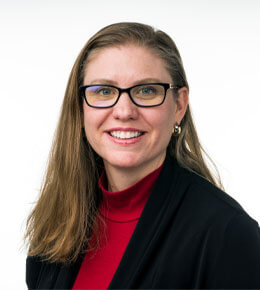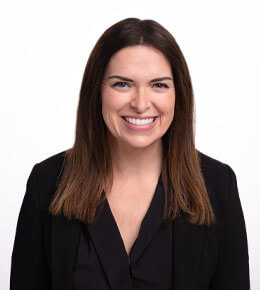USD Faculty Recognized as Distinguished Fellows of the American Academy of Audiology

Jorgensen is chair and professor in the Department of Communication Sciences & Disorders at USD. Messersmith serves as the interim dean of the School of Health Sciences and is a professor in the Department of Communication Sciences & Disorders.
This is the inaugural year for this recognition, which honors audiologists whose extraordinary work has advanced the profession in meaningful and lasting ways, reflecting the leadership, scholarship and vision of James Jerger, Ph.D., who founded AAA in 1988 with 32 other audiologists. Today, AAA serves as the leading professional organization for audiologists nationwide.
We sat down with Jorgensen and Messersmith to learn more about their contributions to the field of audiology and what this national recognition means to them and to USD.
Lindsey Jorgensen
What does it mean to be a Distinguished Fellow of the American Academy of Audiology both personally and professionally?
This recognition is deeply personal and professionally affirming. What moved me most were the letters of support; many highlighted how I’ve made a meaningful difference for others, especially practitioners in the field. Being known as someone who is available, helpful and generous with time and expertise is incredibly rewarding. Professionally, it reinforces the importance of service and mentorship and motivates me to keep lifting others as I go.
What does it feel like to be part of the first group of honorees?
It’s an extraordinary honor to be included among such an inspiring group of professionals. Being part of the inaugural class feels like joining a legacy in progress. This is one built on excellence, leadership and impact. I’m humbled to stand alongside these individuals and energized by the responsibility to uphold the values this designation represents.
How has USD’s audiology program shaped your approach to research, teaching and clinical practice?
USD’s audiology program is rooted in collaboration. Our faculty are deeply engaged across all areas as we teach, conduct research and provide clinical care. This integrated model has shaped my approach to be both holistic and team oriented. It’s taught me that excellence in one area strengthens the others, and that working together elevates everything we do.
In what ways does USD support innovation and leadership in audiology?
USD fosters innovation by supporting interdisciplinary collaboration, community partnerships and a culture that values bold thinking. Our university invests in our clinic and champions the integration of clinical practice with evidence-based teaching. Faculty and students alike are empowered to explore new approaches, not only in research and didactic instruction, but also in how we deliver care to patients. This environment allows us to lead with creativity, compassion and purpose.
What do you hope this recognition communicates to current and future students in USD’s communication sciences and disorders program?
I hope it shows our students that leadership in audiology begins right where they are—here at USD. Our university supports not only academic excellence but also clinical innovation, giving us the space to integrate evidence-based practice into both teaching and patient care. Students see firsthand how bold ideas and compassionate service can coexist. I want them to feel empowered to lead, knowing that their contributions matter and that they’re part of a program that encourages them to think creatively, act ethically and make a real difference in the lives of others.
Jessica Messersmith
What does it mean to be a Distinguished Fellow of the American Academy of Audiology both personally and professionally?
This recognition is deeply meaningful. Personally, it’s a moment of reflection and gratitude. I am forever grateful for the mentors, colleagues and students who’ve shaped my journey. Professionally, it affirms the value of service, outreach and leadership in audiology, and it motivates me to continue advocating for our field.
How has USD’s audiology program shaped your approach to research, teaching and clinical practice?
USD’s program has always emphasized a balance of evidence-based practice, community engagement and student mentorship. That foundation has guided my approach to research that is both rigorous and relevant, teaching that is student-centered, and clinical practice that is compassionate and collaborative.
In what ways does USD support innovation and leadership in audiology?
USD fosters innovation through interdisciplinary collaboration, community partnerships, and a culture that encourages faculty and students to think boldly. Leadership is cultivated not just in the classroom, but through service opportunities, research initiatives and real-world clinical experiences.
What do you hope this recognition communicates to current and future students in USD’s communication sciences and disorders program?
I hope it shows our students that leadership in audiology isn’t reserved for later in their careers. It's not exclusive for those who live in cities and heavily populated areas. It starts now and it starts with them. I want them to see that their voices matter, their ideas are needed and their potential to shape the field is limitless.





